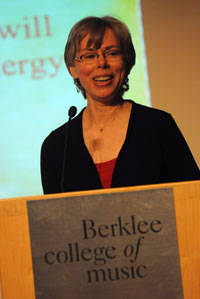"I have been a music therapist for 27 years. For the last 23 of these, I have worked at Kennedy Day School, a program at Franciscan Hospital for Children in Brighton. The school provides educational and clinical services for children ages 3-22 who have multiple intensive special needs. They are students who have intellectual or cognitive disabilities and may also have physical disabilities and/or medical issues."
"How do you use music in ways that will help a child be better at communicating? Music therapists use music to serve the needs of others. One significant way is to help people connect with other people. For a person who is unable to speak or is functioning at a pre-verbal level of development, music may be used to allow for 'conversation.' Using music in clinically directed ways may decrease the isolation often experienced by someone with significant disabilities. Music therapists facilitate these opportunities."
"My first instrument is the flute, but in my music therapy work I rely on piano, guitar, and voice. There are many different ways to approach clinical work. Part of that is directed by the population you are working with. At the Kennedy Day School, a child might come into the music room vocalizing in a certain tonal center. That directs the key selection for the music that will be created. Someone else might have a rhythm expressed in a movement or a vocalization. Music is created from that particular moment in time."
"At Berklee, the Music Therapy Department has developed a strong sense of community among the students and the faculty. Our students really support each other. To be successful, music therapy majors need to be totally committed to their musical development and their academic work. Over four semesters, music therapy majors have the opportunity to gain practical experience in community-based settings. Students work alongside a music therapist in special education, in nursing homes, and with clients in psychiatric and medical settings. In these practicum placements, students take beginning steps in their professional development."

